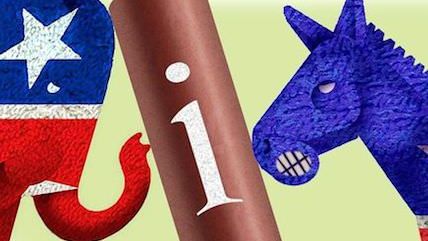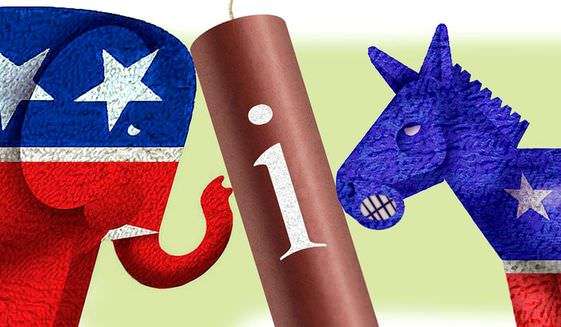Poll: Third-Party Voters Side With Democrats on Police and Foreign Policy and with Republicans on Economics


If November's election for Congress were held today, 42 percent of registered voters say they would vote for the Democratic candidate in their district, 33 percent would vote for the Republican in their district, 13 percent would vote third party, and 11 percent don't know whom they'd vote for yet, according to the latest Reason-Rupe poll.
One may notice these results diverge from Real Clear Politics' 2014 Generic Congressional Vote aggregator which finds among likely voters, 45.3 say they plan to vote Republican and 43.5 percent Democratic.
What explains the difference?
Reason-Rupe offers respondents the option to select a third-party candidate while other polls offer the two-party choices and then ask undecided voters which way they lean. (For instance, see these Fox News, and Gallup polls). There's nothing wrong with asking about only two parties, and will likely yield a more predictive result. However, offering a third-party option reveals which voters are most dissatisfied with the two-party candidate choices, and thus who is at high risk of defection come Election Day.
The fact that a third-party candidate could win or influence the election in several races (e.g. Kansas or North Carolina) demonstrates the importance of identifying the likely "defectors."
Who wants to vote third party?
Our data suggests likely third-party "defectors" might otherwise be potential Republican voters, given that other polls find the parties tied except when a third-party option is made available. But that doesn't mean these voters are Republicans either.
Third party voters tend to be disproportionately younger, male, independent, leaning left, but also lean libertarian on the size of government.
Third-party voters come from both the partisan left and right, and are slightly more representative of Independent-leaning Democrats (34% v 17% national) than Independent-leaning Republicans (18% v 10% national). Nevertheless, they tend to agree with Republicans on the size of government and are as likely as the national sample to be tea party supporters.
When it comes to attitudes toward the police, criminal justice reform, and foreign policy, third-party voters tend to side with Democrats. (See Table) These voters are less favorable of the police (61%), believe the police are not held accountable for misconduct (54%), favor restoring voting rights to non-violent drug offenders (82%), and allowing such offenders to petition a court to have their records sealed (50%).
When it comes to the US combatting ISIS, third-party voters are about as skeptical of air strikes as Democrats (28%), although a majority still favor (64%) their use. Also like Democrats, these voters (52%) oppose sending ground troops to combat ISIS.
However, on economic issues, third-party voters act more like Republicans. These voters tend to say we should pay for military action against ISIS primarily by cutting spending (41%) rather than raising taxes on the wealthy (33%), and that we should lower corporate taxes (54%). Also similar to Republicans, third-party voters say its is acceptable for a business to move states to lower its tax load (73%).
Third-party voters also align with Republicans on the size of government. In a complete reverse from Democrats, 64 percent of third-party voters prefer a smaller government offering fewer services, while 29 percent prefer larger government providing more services (29%). Similarly, 63 percent say free markets solve problems better than a strong government (33%).
Third-party voters are also the only political group in which a majority support allowing unvaccinated children to attend public schools (54%).
What does this mean?
These third-party voters, who likely pose the greatest electoral risk to Republicans, have a marked libertarian streak. They favor constraining government's economic and policing powers and are relatively less interventionist militarily. These data provide a strong indication that Republicans looking to win back votes from likely defectors may need to expand their issue priorities to include criminal justice reform, but also to moderate their positions on foreign policy.
The Reason-Rupe national telephone poll, executed by Princeton Survey Research Associates International, conducted live interviews with 1004 adults on cell phones (503) and landlines (501) October 1-6, 2014. The poll's margin of error is +/-3.8%. Full poll results can be found here. including poll toplines (pdf) and crosstabs (xls).


Show Comments (40)